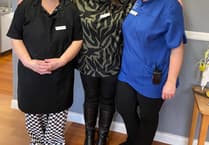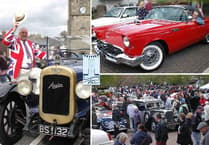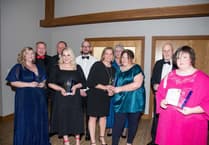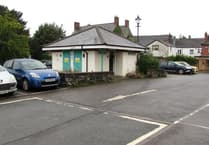FOREST freeminers say the future of the tradition has been given a boost by a Heritage Lottery-funded project.
The Foresters’ Forest project has been working with freeminers to secure a new market for so-called ‘small coal’.
Small coal used to be sold to power stations but demand is falling as the energy sector moves away from fossil fuels to meet government climate targets.
Foresters’ Forest is working with freeminers on the project to convert small coals into a form that can be used in domestic homes.
The transformation will take place at a plant which is being commissioned.
The freeminers have set up a community interest company (CIC) with eight directors to push forward the project.
Two of the directors of the Freemining Futures CIC, freeminers Ray Ashley and Neil Jones, were at an event held on Sunday (September 19) at the Dean Heritage Centre in Soudley to highlight and celebrate the 38 projects that have been assisted by Foresters’ Forest.
It is hoped that by making free-mining economically viable, young people will be attracted to the form of production unqiue to the Forest and which dates back to the medieval period.
Mr Ashley, who has been a full-time miner since 1977, said the partnership with Foresters’ Forest had made the small coal project possible.
He said: “It wouldn’t have happened without Foresters’ Forest.
“We could not have afforded to do this without the assistance of Foresters’ Forest – it just would not have happened.
“Us old fogies can carry on but we need to encourage youngsters to come in.
“I’ve got a grandson who’s interested but for him to carry on, even as a part-time venture it’s got to pay for itself.”
Mr Jones, a freeminer for 35 years, said the key to the work with Foresters’ Forest was to find a way of making small coal generate an income
He said: “One of the problems the free mines have is the small coal.
“Small coal would have been traditionally sold to power stations but that is dwindling because they are trying to close all the small power stations. Every pit produces small coal but you couldn’t get any great money for it and when you sold it you didn’t get a lot for it by the time you’d paid the haulage.
“The other coal we sell as house coal and there is an income from that.
“We couldn’t do anything with the small coal and then somebody came up with the brilliant idea that if we could process that small coal into briquettes, those briquettes could be sold as house coal
“We’ve built a big shed just outside Hopewell Colliery and there is a briquetting plant in there.
‘‘We are in the process of commissioning the machine so the small coal of the Forest of Dean can go though the plant. We can then sell that as house coal, therefore increasing the viability (of the mines).”
“To run a coal mine, whether you do it as a hobby or a full-time thing you have to make money because there is a big expenditure so you have to have cash generation to fund it
“The briquette plant is being run by a community interest company and the purpose of that is to take small coal in, make briquettes and charge for that service.
‘‘The profits will be fed into training to encourage the next generation.”




